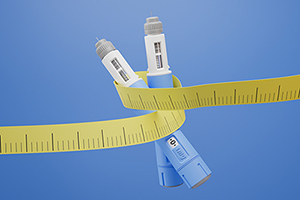



| By Dr. Ronald Hoffman
In addition to levying ever more extortionate taxes on the American populace, the U.S. Government is in the business of issuing statistics. Now comes the ultimate insult hurled at Americans by unseen, all-knowing bureaucrats. The majority of us, the health pundits proclaim, are overweight!
These are the findings from the National Health and Nutrition Examination Survey (NHANES) based on a population sample of 1,615 individuals evaluated in 1999. The Survey concludes that 61 percent of adults can now be deemed overweight or obese. This figure is up 5 percent from 1988-1994, the first period in history during which the number of overweight individuals actually surpassed the number of normal persons.
This makes for great headlines, and is great ammo for the ever-vigilant food police who constantly exhort Americans to eat less and exercise more. Indeed, no one can quarrel with the contention that Americans should clean up their act. Diabetes, hypertension and heart disease are rampant in spite of evermore sophisticated drugs and medical techniques. And an alarming number of younger Americans, including kids, are developing degenerative diseases that could only be related to worsening eating habits and increasingly sedentary lifestyles.
But let’s examine the assumptions that underlie this new onslaught upon the American waistline. It turns out that they depend on what your definition of fat is. For NHANES, that key determinant of physiognomic correctness is the BMI, or Body Mass Index. The BMI is a rather complex calculation that renders your vital statistics (your height and weight) into a raw score, which can then be compared to a scale where less than 25 is defined as optimal. 25 to 29 is overweight and 30 or greater is obese.
Curious, I applied the BMI score to myself. I dutifully entered 5’11” and 174 pounds and discovered, to my horror, that I was poised on the precipice of fatness! My score was 24.6, a mere 4/10ths of a point away from the dreaded 25, which would stigmatize me forever as a member of the 61 percent corpulent majority. Now, if you were to see me, you would not likely characterize me as fat. But here I was, statistically poised to join the beefy brigade. How could this be?
I reflected on this paradox as I watched the N.Y. Giants clinch the NFL playoffs the other night. Tiki Barber, the Giants’ running back, was gaining yards big time, when after an impressive 1st down, his vital statistics were displayed on the screen. Had we calculated his BMI, at 5’10” and 200 pounds, he definitely would have made the cut for overweight! Nonetheless, there probably wasn’t a red-blooded American male football fan swilling beer in the audience who wouldn’t have gladly exchanged physiognomies with the compact Barber. So what gives here?
There’s a clear problem with using the BMI as the sole determinant for overweight. While there is a general correlation between a BMI less than 25 and optimal weight, fit young individuals with good musculature but low body fat might be misconstrued as overweight using BMI alone. In my practice, we evaluate optimal weight via body composition analysis using an electronic method called impedance plethysmography. This device tells you your precise body ratio of lean tissue to fat. Some normal weight individuals can be determined to be excessively flabby, and some seemingly heavy individuals are revealed to be mostly solid muscle. The inherent limitations of the BMI mathematical formula can be overcome, and weight recommendations can be individualized.
So, U.S. Government officials, stop scaring us with misleading statistics; we’re guilty enough as it is. And all that guilt seems to propel us endlessly back toward the refrigerator or the fast-food window for some quick consolation. Imagine the headlines in the year 2050: Health Officials Discover Last Remaining Thin Individual Stuck in Subway Turnstyle; All 453 Million Remaining Americans Now Officially Classified As Obese! President George W. Bush IVth Declares National Health Emergency!
Though we think of declining estrogen as the hallmark of menopause, it's actually common for…

Up to 12 percent of Americans have ulcers at some point in life. Peptic ulcers…
Gallbladder disease is a modern illness. An estimated 20 million Americans have gallbladder disease. The…

Dr. Antonio Bianco, recipient of the American Thyroid Association’s John B. Stanbury Thyroid Pathophysiology Medal,…

There’s a misconception among low-carb dieters. Many people believe a low-carb diet is much higher…

New, more powerful weight loss drugs: Drugs like Wegovy, Rybelsus, Ozempic and Mounjaro/Zepbound are revolutionizing…

Leyla Weighs In: Eating for Energy and Emotional Well-Being

Our virtual voicemail is open 24/7, so there's no need to wait to submit your questions for Dr. Hoffman. Leave a message, and you may hear your question featured on the Intelligent Medicine radio program!